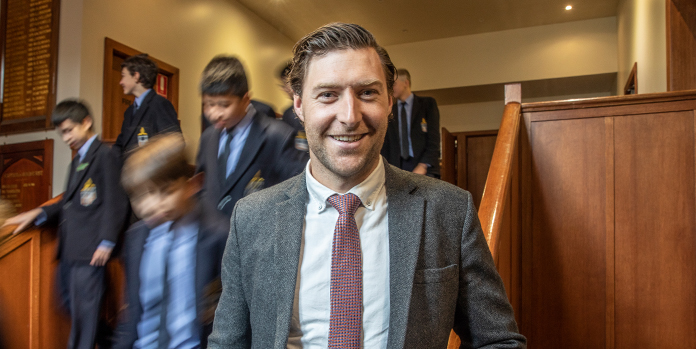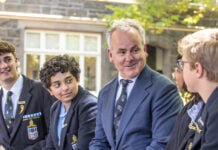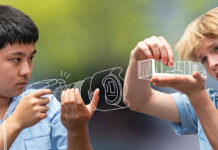Early adolescence is a time of enormous change for young people. Not only are they undergoing enormous physiological and emotional growth, but it is also the time when many move into a dual existence in both physical and digital worlds.
These young people are confronted with the challenge of navigating a complex web of online and offline networks, at times disorienting them in the process.
At Wadhurst we focus on supporting young people transitioning through these and many more changes. Many students will enter Wadhurst apprehensive about the commencing of secondary school only to bound into Senior School two years later with confidence.
Sitting at the heart of this transformation is a commitment to equipping our students with clear expectations, diverse learning opportunities and consistent mentorship through the fostering of relationships.
The importance of relational learning
Boys typically engage best through relational learning. Relational learning at its core fosters a strong working relationship between students and teachers engaging in a working alliance. Rather than relying on hierarchy or other forms of power, at Wadhurst, our teachers build relationships with their students based on trust and affirming their needs, interests and sense of belonging at School.
We encourage our teachers to develop a repertoire of relational gestures they can deploy to cultivate positive working relationships and a strong learning environment. Supporting this important work, our four (soon to be five) Heads of House at Wadhurst play a leading role in helping our students to find connection and identity within our campus. They also hold the responsibility of leading the restoration of relationships and resolving conflict.
Relationships in a digital world
An increasing challenge for young people is the recognition that online choices have offline consequences. Growing in prevalence is the normalisation of the exposure to and sharing of restricted online content unsuitable for children such as explicit material or high impact violence.
Supporting young people to navigate this complex space requires the School and parents to work in partnership to equip our students with the tools needed to make the right decisions. Furthermore, keeping our students accountable to our School values and expectations when they make choices that come into conflict with our code of conduct online is paramount in their learning process. As we work with students traversing a precarious online environment, we as educators must balance learning and accountability.
Students and parents are offered evening workshops that address online behaviour from an educative perspective. Learning about e-safety is reinforced at School with lessons in our Health and Physical Education classes, workshops at the House level and discussions in our Wadhurst assemblies. When a student fails to meet our expectations, serious consequences and support measures are issued.
Each day at Wadhurst the building of positive relationships is considered critical in forming the necessary foundations for supporting our students with transition through a critical period of their life.
The Wadhurst Middle School years continue to be defined by clear expectations, accountability, and relational learning to ensure that our students are prepared to walk the tightrope between their physical and digital worlds.
Rob Mann
Deputy Head of Wadhurst
About Rob Mann
Rob Mann joined Melbourne Grammar School as Deputy Head of Wadhurst in 2023.
He holds a Bachelor of Education and a Master of Education (Management and Leadership) from Deakin University.
A Humanities specialist, Rob has taught History and English across Years 7 – 12 for more than 10 years. His former roles include Head of various year levels and acting Head of Senior School at Mazenod College.



